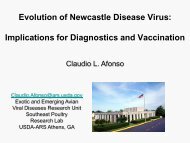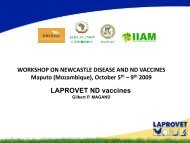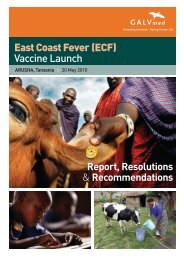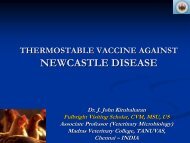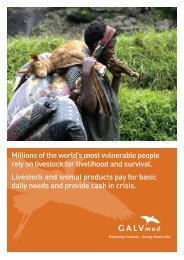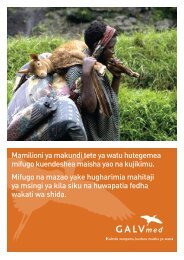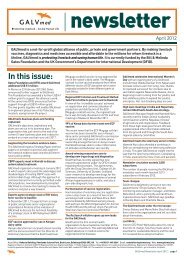A Path to Prosperity New Directions for African Livestock
GALVmed Impetus Strategy Paper
GALVmed Impetus Strategy Paper
- No tags were found...
Create successful ePaper yourself
Turn your PDF publications into a flip-book with our unique Google optimized e-Paper software.
Box 7 Contract Farming – Case Studies<br />
Nestlé Milk Procurement and Farm Assurance Schemes<br />
Milk marketing has been at the core of Nestlé’s business interests since 1866. After expanding<br />
through Europe and the USA, Nestlé started businesses in South America and the Caribbean from<br />
1921 and in Asia from 1961. Globally Nestlé purchase five million <strong>to</strong>nnes of milk daily, primarily direct<br />
from farmers. The company is very aware that small-scale milk producers have competitive<br />
production costs and thus, if organized, have the potential <strong>to</strong> compete with large-scale,<br />
capital-intensive “high-tech,” dairy farming systems in developed and developing countries.<br />
Over the decades the company has come <strong>to</strong> understand that the challenges of buying direct from<br />
small farmers vary with the level of development of the country. For example, in middle income<br />
countries where production of lives<strong>to</strong>ck is rapidly increasing along with demand, there is greater use<br />
of agro-chemicals, whilst effective regulation of their use is still weak. The company there<strong>for</strong>e invests<br />
in developing moni<strong>to</strong>ring schemes <strong>for</strong> contaminants in raw materials, often in close collaboration<br />
with the authorities. In least developed countries, where the purchasing power of the population is<br />
limited and farmers are still producing <strong>for</strong> in<strong>for</strong>mal markets, more emphasis is placed on supporting<br />
farmers <strong>to</strong> achieve good agricultural practices. Less emphasis is required on contaminants in milk,<br />
but there may be more feed contamination e.g. myco<strong>to</strong>xins due <strong>to</strong> poor s<strong>to</strong>rage conditions.<br />
To manage challenges, Nestlé have developed five key <strong>to</strong>ols:<br />
1 Quality control schemes, including moni<strong>to</strong>ring of contaminants<br />
2 Specifications <strong>for</strong> acceptance and rejection of raw materials<br />
3 Farm quality assurance schemes<br />
4 Supplier assessment and selection<br />
5 Supplier education and development<br />
In Pakistan, <strong>for</strong> example, Nestlé works with farmers in 3000 villages over an area of 70,000km 2 with<br />
each farm providing on average 10kg of milk per day. Nestlé is responsible <strong>for</strong> the collection and<br />
processing of the milk and employs a further 2000 people in that process. The company also works<br />
with the farmers <strong>to</strong> increase their expertise and has recorded increasing yields per farm. These have<br />
increased significantly over the past decade, obliging Nestlé <strong>to</strong> open a new milk processing plant 132 .<br />
The Impetus Strategy Paper I Page 47



